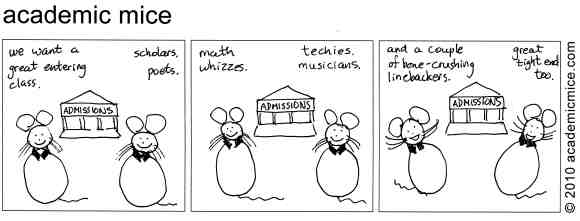I finally finished my grad school (for a PhD in EE) and fellowship (for money) apps! Now it’s time to relax, run, and read some books. But first, let’s reflect…
A few years have gone by, but most of us still remember our senior year of high school and the ups and downs of college admissions. Forms. Long essays. Short answers. 500 words. All kinds of letters: ECs. SATs. ACTs. Rec letters. Brag sheets. College Confidential. Common App supplements (WHY?). And of course, the all-important US News & World Report rankings. Man, I’m glad all that’s behind us.
But there are plenty of letters in the grad school application process too: GPAs. GREs. Rec letters. Nothing but a big rat race. Right?
The main difference between applying to college and applying to grad school is what you’ve learned in the intervening years. You can equate research statements to admission essays, GREs to SATs, rec letters to rec letters, but nothing takes away the fact that you’ve lived and learned and attended college for 1461 days from one stepping stone to the next. But… so what?
When you apply to college, you don’t really have any other options. Sure, you can take a year (or even two!) off to travel or start a company or build character or do any number of interesting gap-year activities, but let’s be honest, you—you being the type of person who wants to go to, whose parents went to, Stanford or Duke or OSU or any other seat of higher learning—are going to end up in college, sooner or later. No one questions that: It’s simply, well, expected. And sure, why not? Very few people know at the age of 18 what they want to do with their lives, and everyone knows that college is the ultimate guarantor, the yellow brick road to a successful future. Seems like a no-brainer: Go to college. Apply to a few, choose one, and go.
Now fast-forward 4 years. You spent the last 3+ years pursuing what you hope is your life’s calling, or at least a step in the right direction, which it might be, but maybe not, and who really knows anyway? The real dilemma is that, for the first time in your life, you’re an adult, and you have a real choice to make. College is college, but PhD program ≠ med school ≠ software engineering job ≠ consulting job ≠ freelancing ≠ … It’s not until senior year that you finally feel the weight of all those pesky little underclass decisions. Suddenly you’re 21, your undergrad career turns into your career career, and you still don’t know if you chose the right major.
Seniors always get asked The Question—”What are you doing next year?”—which only adds to the feeling that what we choose to do immediately after graduation will define our life’s direction. Maybe it will. But honestly, I don’t think it’s worth worrying about. Just as there’s no right major, only the right motivations for choosing it (i.e., it’s interesting to me, right now), there’s probably no single right career path for anyone. As far as I can tell, pretty much nothing career-related turns out quite the way you expect it to—how many of us have changed our majors, our hopes, our dreams since freshman year?—and it takes just as much courage to pursue a possible passion as it does to pursue a true passion. How are you going to find out which is which, unless you follow through with one?
And that brings us back to the difference between applying to college and applying to grad school: As a high school senior, applying to college, I had every possible career available to me: astronaut, surgeon, chef, engineer, lawyer, anything. It didn’t matter where I went to school; East Coast or West, all those opportunities—all possible responses to “What do you want to be when you grow up?”—would remain open to me. In that sense, the college decision wasn’t all that important. But the further I got into college, the more that space of future possibility funneled down into a cone of menacing definiteness—for me, {everything} => {physics, engineering, psychology} => {engineering} => {electrical engineering} => {solid-state devices and optoelectronics}. And that’s scary. But it’s also something of a blessing.
As a Stanford senior, applying to grad school, I know much more precisely what I like and what I don’t like, which means that I can narrow my options in the direction of the former and pursue it without fear. It doesn’t matter if my aim isn’t perfect. (Who knows? Maybe I’m meant to be a coder. God forbid. :)) As long as I’m headed in the right general direction—anywhere in the mouth of that funnel of life—I’m sure I’ll end up where I want to be. Wherever that is.
And I can still be anything I want when I grow up, as long as a PhD in EE doesn’t make me overqualified.
-Joel
P.S. If you’re a college student (±5 years), I highly, highly recommend reading this essay by William Deresiewicz, “What Are You Going to Do With That?,” “That” being your college degree. I think you’ll find it instructive, inspiring, and even a little disturbing in its acuity.
P.P.S. Merry Christmas!



Hey Joel – it’s been years since we’ve talked, but I just wanted to let you know how much I appreciated this post. You mentioned many things that have been on my mind all throughout college so far. I read (…skimmed) the Deresiewicz article that you linked, and I nearly cried because I could relate to so much of what he said. Anyway, thanks for the post! And I hope you’re not creeped that I’m reading your blog when we haven’t talked in years…Lance told me to.
Hey Christine! It’s great to hear from you, and I’m glad you enjoyed and got something out of the post. 🙂 Happy holidays!